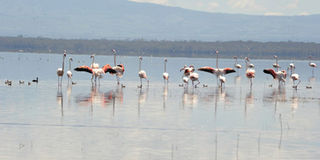There’s nothing unique in very good or bad

Flamingos in Lake Nakuru. To be unique is to be the only existing one possessing a certain quality, physical or mental. FILE | PHOTO |NATION MEDIA GROUP
What you need to know:
You are unique only if you are the only one possessing some quality, physical or mental or otherwise.
The word unique, then, is only an adjectivisation of the French numeral un (male) or une (female), which also just means “one”.
To be unique is to be the only existing one possessing a certain quality, physical or mental.
From the way in which the word frequently reaches my ears and eyes — namely, from the mouths, pens and computer pages of East Africa’s users of the English language — the word “unique” seems to mean “very good”, even “excellent”. But, in reality, unique means no such thing. No matter whether it is very good or very bad, a thing or idea is unique merely if it is the only example of its kind existing in a given situation.
HUMAN SPECIES
Indeed, from the very etymological root of the word unique, that stands to reason. English has recently borrowed that word from French, right across the narrow stretch of water that divides the two often mutually hostile Western European nations. The adjective unique comes from the French numeral un (male) or une (female), which is etymologically related to the neutral English numeral one.
You are unique only if you are the only one possessing some quality, physical or mental or otherwise. The word unique, then, is only an adjectivisation of the French numeral un (male) or une (female), which also just means “one”. To be unique is to be the only existing one possessing a certain quality, physical or mental.
Let us reiterate that idea. One apparent and important uniqueness of the human species is its ability to move upright on two legs. But I say “apparent” for the very good reason that, being a whole vast cosmos, our own may, in one or another of its myriads of niches, be hosting a special species, still unknown even to Homo Sapiens Sapiens (the self-declared “all Knowing” mankind) biologically much more developed.
That is why I use the adjectives “probable” and “apparent” in some of my statements. For we just do not yet know for certain whether or not one of the planets “above” or “below” ours has evolutionarily created a still living species much more developed — both mentally and physically — than humankind. Of course, psychologically, it would be excellent for us to acquire such knowledge.
NAGGING QUESTION
The persistently nagging question is: Why? Because we would then know that, even mentally and manually, we are not really alone in this universe. In its mental inventiveness, the human animal has, of course, artificially created such other beings.
We sometimes call them “angels” and often imagine them to fly between heaven and earth to communicate the heavenly dictates to the extremely hard-headed creatures that human beings evidently are.
But, if you are concerned, one apparent question will seem persistent. First, it would profoundly boost our specific psyche if the human species acquired the knowledge that we have such close evolutionary cousins far above the clouds, namely, in the place where the heavenly one is said to be residing to await the human beings who have behaved in a certain way prescribed by a set of starry-eyed human beings known as priests.
The writer is a veteran journalist





